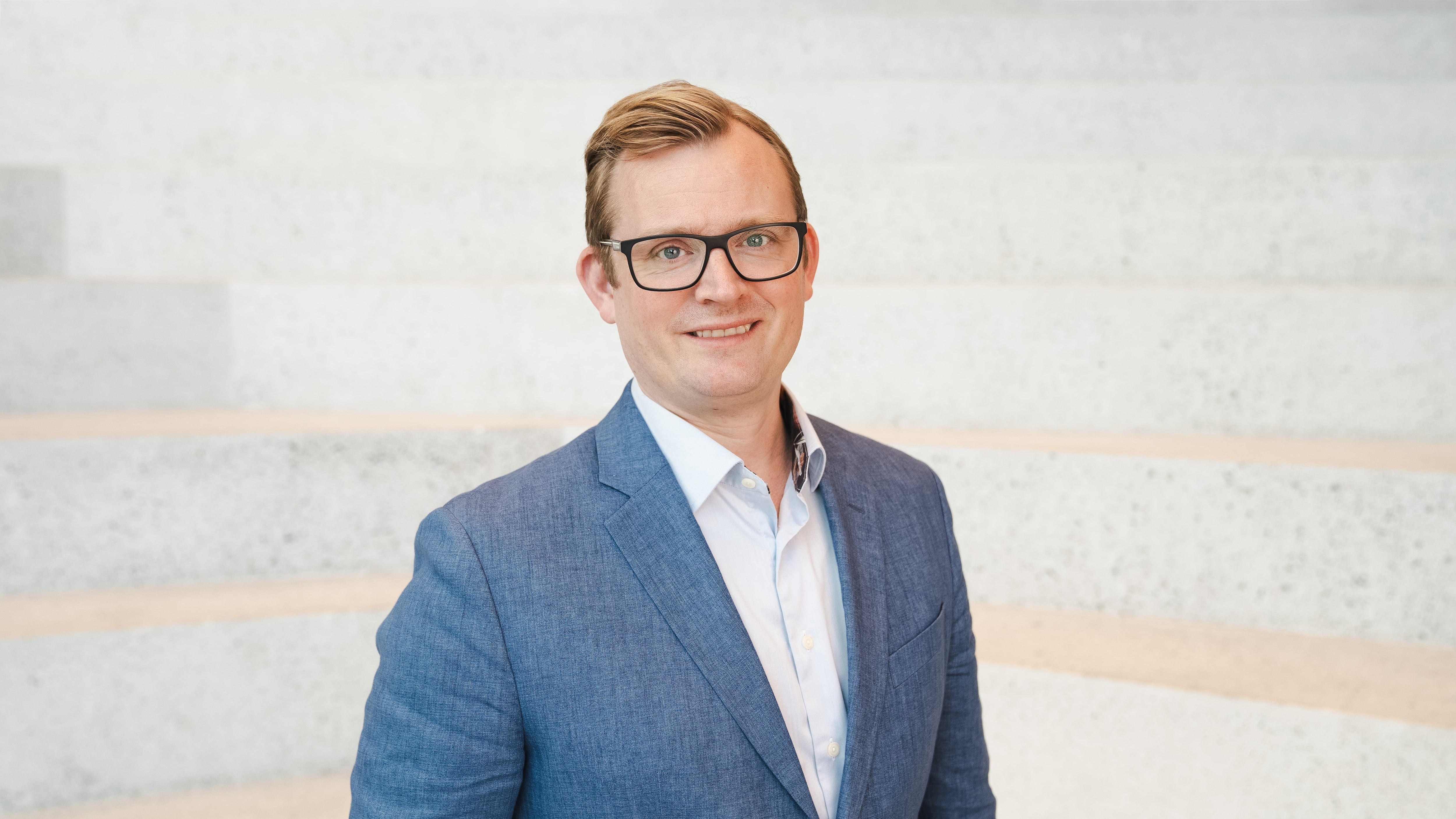Simon Boas Hoffmeyer, VP, Global Head of Sustainability & ESG, has been leading Carlsberg’s sustainability efforts for the last decade. But he’s been working in sustainability for most of his career: having been inspired by global travels during his training.
He tells us what Carlsberg’s working on; how the food and beverage industry can work together to drive change; and his top tips for getting into a career in sustainability.
What’s the headline goal at Carlsberg we should know about when it comes to sustainability?
At Carlsberg, we have an overarching sustainability programme. However, what truly drives us is our ongoing dedication to making a meaningful impact: both for our business and for wider society. We strive to act consistently, always focusing our efforts where they will make the greatest difference.
Given the ever-growing urgency of climate change, our commitment to achieving a net zero value chain stands out as a vital priority. This commitment underpins a broad range of initiatives, from decarbonising our operations – especially by reducing emissions linked to agriculture – to protecting ecosystems and biodiversity.
For us, expanding our efforts in these areas is more than a requirement: it’s a chance to set the standard and drive positive change well beyond our own company.

How difficult will this be?
Achieving this goal takes a whole new level of coordination and integration within our company –something we’ve been building up over many years. But it also depends on a major shift across society: policymakers, suppliers, consumers, and everyone in our value chain need to be involved. We’re stepping up our advocacy work to help drive change not only in our breweries, but throughout our whole network.
Of course, there are plenty of challenges along the way, and the path to a net zero world by 2040 isn’t completely clear yet. The next few years will be critical in the fight against climate change.
Despite the hurdles, I’m still optimistic that, together, we can drive innovation, develop new technologies, and make practical changes on farms and among our suppliers to introduce more low- and zero-carbon solutions. Ultimately, making this vision a reality will require consistent, long-term commitments from governments and civil society as well.
Tell us about a sustainability achievement at Carlsberg you’re proud of
One standout achievement I’m especially proud of is our early adoption of ambitious science-based targets in 2017 – becoming one of the first ten companies globally to do so.
This commitment didn’t just set our internal direction; it sparked a wider movement in sustainability that continues to grow, even in the face of considerable challenges. These targets have translated into tangible actions, such as launching decarbonisation projects and introducing regenerative practices across our French, UK, Danish, and Finnish markets.
Consistency and persistent focus have been key to maintaining momentum, ensuring that our approach remains both innovative and impactful as we move forward and expand these efforts across even more regions.
How do you manage, prioritize and keep up with multiple sustainability initiatives across the business?
To effectively oversee and deliver on these diverse sustainability initiatives, we have developed a well-integrated governance model for our ESG programme.
This framework guarantees that every target is assigned a clear owner, backed by a detailed roadmap and actionable plans.
Our top management remains engaged and informed, thanks to full transparency and buy-in at every stage.
Our ESG Steering Committee includes both our CEO and CFO. Their participation ensures that strategic and practical discussions are not only robust: but also fully aligned with our business priorities – turning ambition into meaningful progress across the organisation.
Simon Boas Hoffmeyer
How do you champion sustainability internally and keep employees engaged with your mission?
A central part of our mission is to demystify complex sustainability topics and bring them down to earth for our teams and consumers.
We encourage every market to adapt our global strategy to fit local realities, choosing themes that resonate most with stakeholders on the ground, all while moving in sync with our broader company ambitions.
As we like to say, “beer is not an elitist product, so our communication around it shouldn’t be either.” By making our messaging accessible and relatable, we foster genuine engagement – everyone can see themselves reflected in the journey and feel empowered to contribute.
This philosophy guides not only our external campaigns but our internal communications and initiatives as well, ensuring the sustainability mission remains relevant, inspiring, and actionable at every level.
Where are the biggest opportunities to drive change across the food and beverage industry?
It’s impossible to overstate the power of collaboration and partnership. We move much further, much faster, when we don’t try to go it alone but instead cultivate genuine buy-in from a wide range of stakeholders. For instance, the introduction of efficient deposit return schemes – when embraced collectively – can dramatically improve recycling rates and resource circularity.
Similarly, collective action at the farm level opens up new possibilities for regenerative practices, shared knowledge, and greater resilience throughout the supply chain. These initiatives not only accelerate progress but also ensure that everyone, from producers to consumers, becomes part of the solution. Harnessing this spirit of shared ambition is, I believe, the industry’s greatest lever for large-scale, lasting change.
What are the biggest challenges to driving change across the food and beverage industry?
One significant challenge in pushing for rapid, meaningful change across the food and beverage sector is the sheer complexity and fragmentation of global supply chains.
Implementing sustainability programmes at speed can feel like steering a fleet of ships, each navigating different waters. Yet, this very disaggregation also becomes a source of strength: it forces us into deeper, more frequent conversations with our suppliers, giving rise to genuine partnerships and shared problem-solving. Together, we have the opportunity to set common goals and identify innovative solutions that might never emerge in a more centralised system.
Compounding these logistical hurdles, the evolving geopolitical landscape exerts fresh pressure on sustainability progress. As governments re-examine GDP forecasts and recalibrate their policies, the commitment to long-term environmental goals is often tested by short-term economic imperatives. My hope is that the industry—and the world at large—will resist the pull of short-termism and instead keep its gaze fixed on the necessity for consistent, large-scale change. True transformation demands patience and persistence, not just ambition, and every initiative must be robust enough to weather these shifting tides.
Q: Tell us about a brand you admire for their commitment to sustainability
"One brand I deeply admire for its commitment to sustainability is Patagonia . The company stands as a beacon in the apparel industry, driven by an authentic desire from its founder, Yvon Chouinard, to overturn not just fast fashion but also rethink the entire food system. Patagonia’s approach is holistic, rooted in a philosophy that prioritises environmental responsibility and social consciousness at every turn.
"Chouinard’s story – captured brilliantly in his book, “Let My People Go Surfing” – reveals a radical vision for business: one that challenges conventional profit motives and places the wellbeing of people and planet at its core. If you haven’t read it, I highly recommend picking it up; it’s a testament to how bold leadership paired with unwavering purpose can spark systemic change.
"Patagonia makes it clear that sustainability is not a marketing slogan, but a daily practice and a long-term promise. I am also super proud that his move to change the ownership structure to a foundation, with Earth as its only shareholder, was inspired by the Carlsberg Foundation setup.
"On a personal note, meeting Yvon Chouinard in Ventura in 2019, exchanging ideas on sustainability and governance was a truly lifechanging experience – his passion and authenticity left a profound impression on me and reinforced my own commitment to sustainability."
How did you get into a career in sustainability?
My entry into sustainability was shaped early on by the values instilled at home. Growing up, my parents placed great importance on avoiding over-consumption and for example made composting in our backyard a natural part of daily life.
When attending business school and studying in China for 8 months, this was complemented by a global perspective – I was made aware of the far-reaching effects of industrialisation. These experiences sparked in me a desire to effect change from within organisations, inspiring me to pursue a path where I could help redefine what prosperity means. I found myself drawn to the challenge of aligning economic development with social wellbeing and environmental stewardship – believing firmly that true progress is only possible when all three move forward in sync.
What’s your top tip for others interested in careers in sustainability?
My top tip would be to follow your passion with conviction, but never lose sight of humility along the way. Sustainability is a field brimming with complexity and nuance, and no single perspective can capture its full scope. If you ever find yourself feeling like the smartest person in the room, take it as a cue to invite new voices, seek fresh input, and challenge your assumptions.
The most transformative solutions often emerge from unexpected places and diverse viewpoints. Stay curious, open-minded, and willing to learn: these qualities will not only enrich your career but also drive the kind of collaborative progress our world so urgently needs.
Any final words of encouragement for others working in sustainability?
In the tough times, remember that all things are temporary. Remind yourself; this too shall pass. The journey toward sustainability is often marked by setbacks and uncertainty. Endurance is forged in difficulty, and even the most stubborn challenges eventually yield to steady, thoughtful persistence. Allow yourself space to pause, reflect, and renew your sense of purpose – trusting that change, however gradual, is always underway.
Keep moving forward with intention, knowing that the impact of your work will outlast today’s obstacles and lead to a better tomorrow on the other side!



